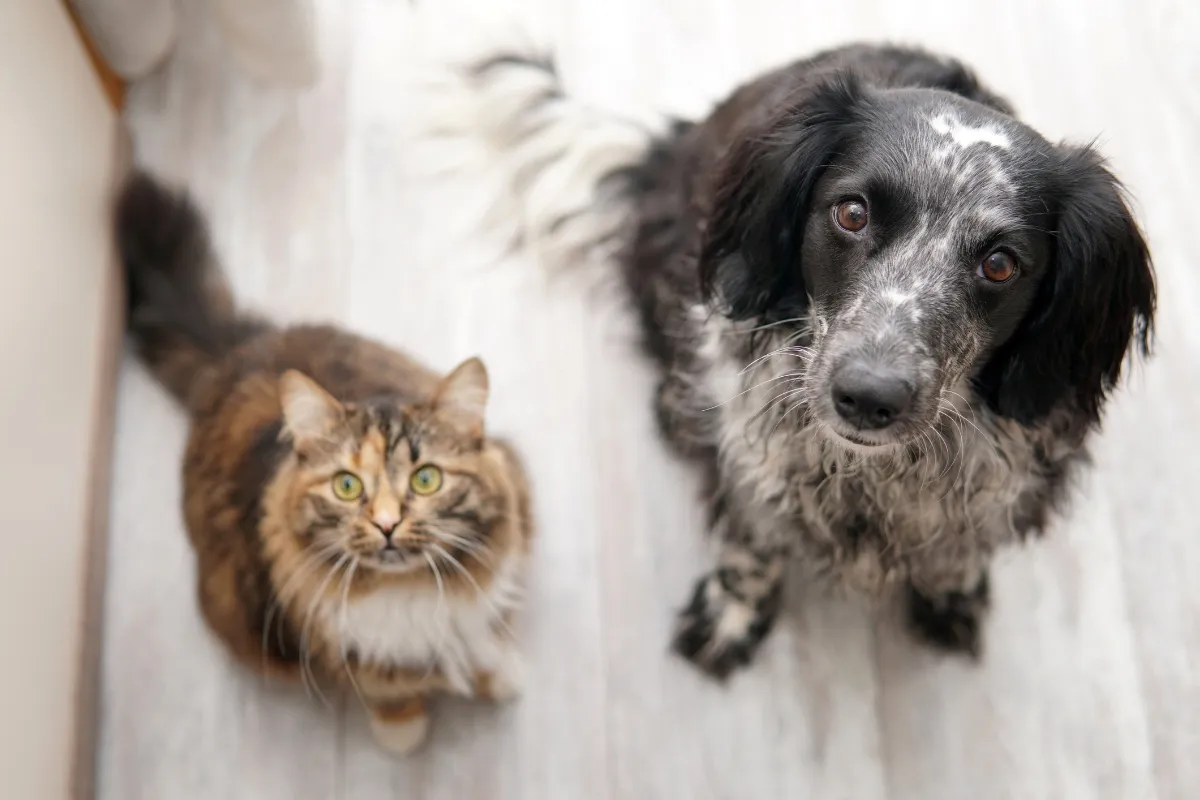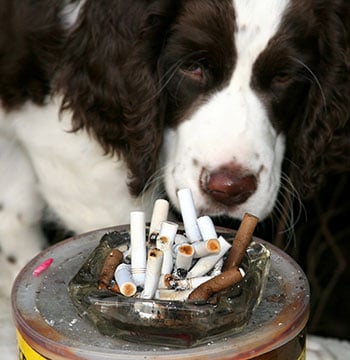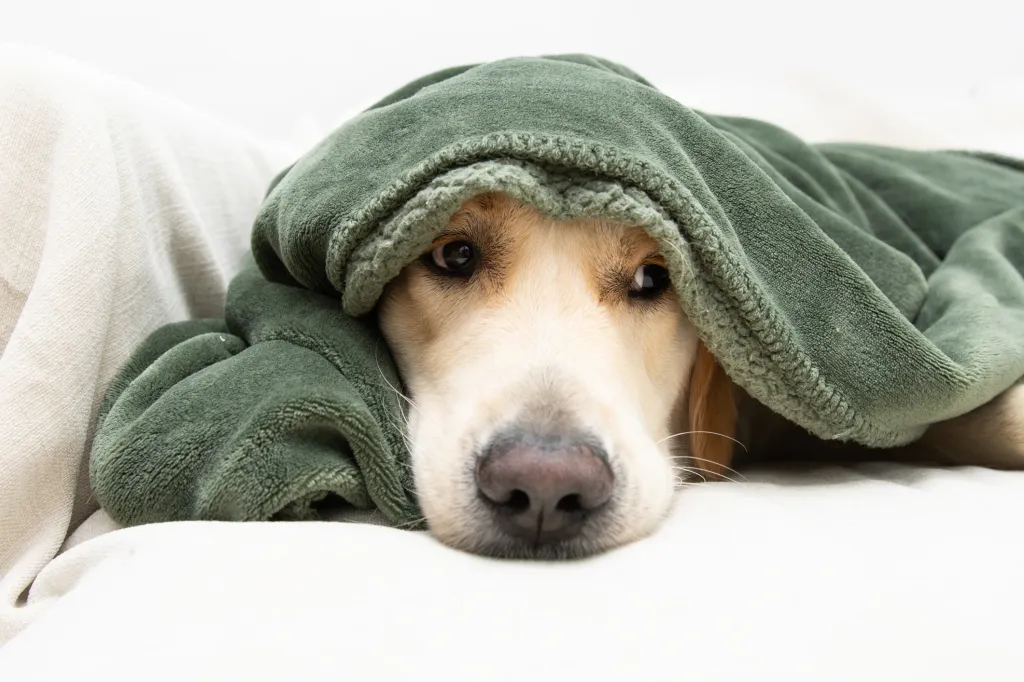Key Takeaways
- If you are a smoker, smoking inside will create unhealthy secondhand smoke, which impacts humans and pets similarly.
- When people smoke cigarettes, they release a range of harmful chemicals into the air, including carbon monoxide, formaldehyde, benzene, and particulates.
- Pets exposed to secondhand smoke can develop many dangerous conditions, including asthma and cancer of the lungs, nasal passages, and lymphoid tissues (lymphoma).
- Eliminating smoking is the best way to protect your dogs and cats from secondhand smoke.
Table of Contents
As pet parents, we want to provide our furry friends with a safe and healthy environment. However, it’s easy to forget that our unhealthy habits can significantly impact their well-being. One of the most common and harmful habits is smoking around our pets. Smoking, especially indoors, creates secondhand smoke, affecting everyone in the home, including pets.
Secondhand smoke from cigarettes, cigars, and pipes can be just as dangerous for our pets as it is for us. Secondhand smoke from marijuana is also unhealthy and carries some additional risks. We’ll explore the effects of secondhand smoke on pets, why it’s essential to avoid it, and how it can affect cats and dogs differently.
Secondhand smoke from tobacco
When people smoke tobacco, they release a range of harmful substances into the air, including carbon monoxide, formaldehyde, benzene, and small particles that can travel deep into the body. The risk of secondhand smoke to humans is why states banned smoking in offices, restaurants, and other public spaces starting in 1995. Just as we do, our pets inhale these toxins, leading to various health problems and, in some cases, a shortened life span.
A pet living in a house with a smoker is subject to respiratory issues, cancer, and a weakened immune system. A recent study by the Veterinary Journal found that Scottish terriers who lived in homes with smokers were six times more likely to develop cancer than those who did not.
“Pets have very sensitive respiratory systems,” adds Dr. Zac Pilossoph, a consulting veterinarian and expert on pets and cannabis. “Smoke can irritate your pet’s lungs, potentially causing a cough or exacerbating existing conditions like asthma.”
How dogs and cats are affected differently
Cats are particularly sensitive to secondhand smoke. Those in smoky homes are more likely to develop cancer of the lungs or lymphatic system (lymphoma) and respiratory problems such as asthma.
Also, cats suffer health consequences from “thirdhand smoke” — the residue that clings to furniture, rugs, and pet fur long after the air in the room clears, according to VCA animal hospitals. When cats groom, they can develop tumors in their mouths from licking off toxic particles that accumulate on their fur from smoke-filled air. These tidy felines expose the mucous membranes in their mouths to carcinogens that cause oral tumors.
Dogs exposed to secondhand smoke have more eye infections, allergies, respiratory issues, and lung and nasal cancer than those not exposed, the VCA says.
Studies show that long-nosed dogs (collies and Labradors, for example) are especially susceptible to nasal cancer because the increased surface area in their nasal passages traps inhaled particles. In fact, the incidence of nasal tumors is 250% higher in long-nosed dogs living in smoke-filled environments, the VCA hospitals report. Short-nosed dogs are more likely to develop lung cancer because inhaled particles have an easier time making it to their lungs.
Signs your pet is suffering from secondhand smoke
While cancers and other health problems develop over time, there may be earlier signs your pet is suffering from secondhand smoke. If you can smell the smoke, your pet is exposed and affected by it.
Some symptoms are:
- Eye irritation
- Coughing
- Sneezing
- Wheezing
- Shortness of breath
Dangers of marijuana
With more states legalizing marijuana over the last decade, pets are being exposed more to cannabis, both in secondhand smoke and accidental ingestion. As one indicator, the Pet Poison Hotline has seen a 448% increase in reported cannabis cases over the past six years, with the majority of those cases involving dogs or cats ingesting food products that have some form of cannabis derivative added to them (i.e.,”edibles”). If a pet consumes any products containing THC, the “high-inducing” ingredient in pot, call your vet right away. Other non-intoxicating elements of the marijuana plant, such as hemp and CBD, are not dangerous for pets. In fact, CBD is becoming popular with pet parents to help ease anxiety in pets.
The signs to look for in cats and dogs that have been exposed to marijuana smoke closely resemble marijuana ingestion, according to Sugar River Animal Hospital.
These signs may indicate your pet has ingested THC or absorbed it through heavy smoke:
- Lack of coordination
- Dilated pupils
- Drowsiness
- Disorientation
- Tremors
- Vocalization
- Urinary incontinence
- Drooling
Secondhand marijuana smoke may also contain higher levels of several potential toxins and be more harmful to pets than cigarette smoke.
Nicotine poisoning in pets
In addition to the hazards of a smoky home, pets can also get nicotine poisoning if they swallow tobacco. Symptoms can include:
- Vomiting
- Diarrhea
- Tremors
- Seizures
- Fast or slow heart rate
If you suspect your pet has ingested tobacco products, including nicotine patches, smokeless tobacco, or e-cigarettes, contact your veterinarian immediately. Depending on the amount and symptoms, treatment may include fluid therapy, anti-nausea medication, sedation, blood pressure monitoring, and additional supportive care, according to the Pet Poison Helpline. Low-dose ingestions generally have an excellent outcome. However, the prognosis for high-dose ingestions is poor unless treatment is initiated early, the helpline states.
Avoiding pet exposure to secondhand smoke
Now that we know how harmful secondhand smoke is for pets, we want to avoid it. The best solution to eliminating secondhand smoke is to quit smoking, but if it were that easy, most smokers would have quit by now. Concerns about the negative impact on a pet’s health could provide an extra incentive. A 2009 study by the National Library of Medicine, demonstrated that 28% of smokers said they would try to stop smoking after learning that secondhand smoke was detrimental to their pets’ health.
There are many resources to help people quit smoking, including nicotine replacement therapy, support groups, and counseling. Here are just a few resources:
If quitting completely is not an option, just cutting back will be healthier for you and your pet. If you are smoking, limit consumption to outside the home, away from your pets. The smoke will dissipate outside and improve your indoor air quality. Always wash your hands and change your clothes before handling your pets to avoid any residual toxins on your skin and clothing.
Conclusion
In conclusion, secondhand smoke is just as dangerous for our pets as it is for us. It’s essential to take the necessary steps to protect our furry friends from the harmful effects of tobacco and marijuana smoke. If you’re a smoker, quitting is the best thing you can do for your health and the health of your pets. Shy of that, try to limit smoking to outside the home.










